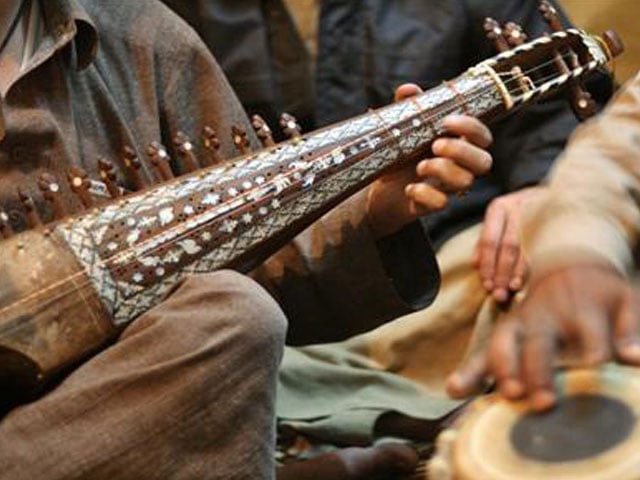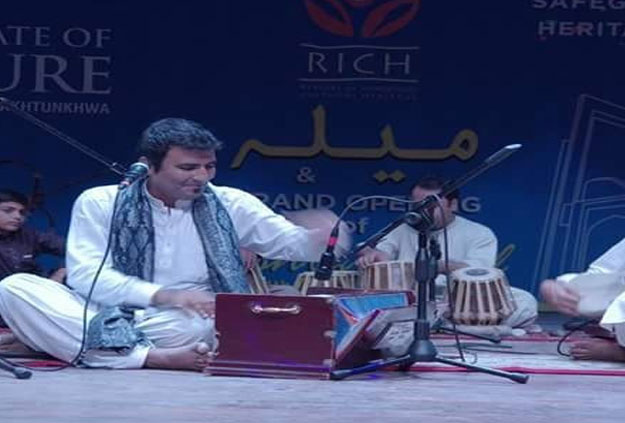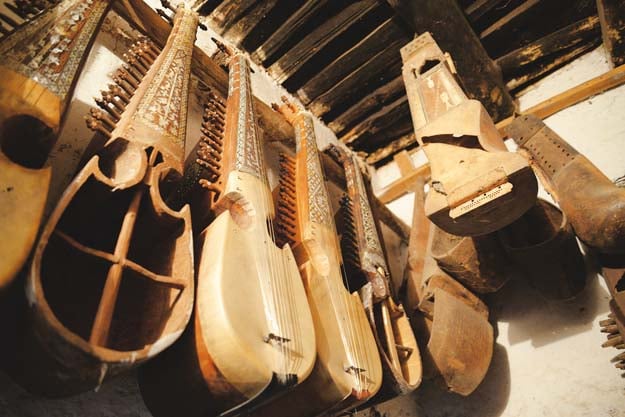Listening to the tunes of peace in Khyber Pakhtunkhwa
When people in troubled province were frustrated due to terrorism, they found solace in music

Musicians play music in Peshawar March 3, 2008. PHOTO REUTERS
The K-P has seen the worst of conflicts in the past decade. As terrorism spread like wildfire, Pashtun musicians launched a musical movement against terror; sang over 900 peace songs in the last 10 years. People in the war-hit region find solace in those songs.
Almost everywhere in the province, particularly in the areas where terrorism created havoc in peoples’ lives, people are listening to peace songs. But who are those people?
K-P witnesses 43% drop in terrorism incidents
First, the victims who lost their parents, siblings and suffered years of mental torment. Second, the intelligentsia which understood the complexity of terrorism and the resulting societal, political and economic consequences of it.
 Pashto singer Rashid Ahmed Khan. PHOTO: FACEBOOK
Pashto singer Rashid Ahmed Khan. PHOTO: FACEBOOKFor the victims, peace music and songs have become a way of expressing their anger and sadness. They look for hope and inspiration in them to cope with their experiences.
“When I am hopeless and upset, I find comfort in peace songs because most of them carry the messages of encouragement. They keep us away from pain,” says Saleem Shinwari, a 24-year-old shopkeeper at Peshawar’s famed Qisa Khwani Bazaar. He lost his father and brother in a 2012 terror attack.
Some peace songs, Shinwari says, well describe the horrors of catastrophic incidents that left us distraught, sometimes extremely emotional.
Since over the last three decades, Pashtun society has been in a state of conflict but its culture and music have been used as a logical enemy of conflagration and powerful instruments.
In the worst of times, K-P sang along
“The more there were conflicts and hardships, the more people sang and heard peace songs because when there is war, there will also be talk about peace,” says Sanaullah Khan, an MPhil student of Pashto literature in Peshawar.
When the Taliban established their government in Afghanistan in 1996, they put a blanket ban on music; however, a new trend of peace songs evolved. Most of the Afghan Pashtun musicians came to either K-P or Pashtun-populated districts of Balochistan to continue their musical journey. However, when Hamid Karzai formed his government, the wave of terrorism spread to K-P in 2007 and the peace music trend started flourishing here.
 Rabab. PHOTO: EXPRESS
Rabab. PHOTO: EXPRESSAccording to Sanaullah, when people face starvation they seek food and in the same way, when people face a war, they long for peace. “Peace music has been raising awareness among the confused lot, who are silent even during war. It enables them understand the seriousness of the situation,” he adds.
Whenever there is a peace musical gathering in K-P, people converge in huge numbers to participate. Apart from creating a desire in the hearts and minds for peace, these melodious meetings are meant to bring a diverse audience from different backgrounds on one platform.
“Peace music gatherings do not only unite people, they also impact people's thoughts and mentality by making them positive about their circumstances. They tend to change the mindset of the listeners.”
For many singers, music has been the most effective and perhaps the only way to criticise violence and promote the messages of peace and tolerance.
‘Why criticise dance instead of terrorism?’
“Peace songs emerged because people were afraid. Terrorism silenced them and the fear among them doubled. On one side, there was the noise of bullets and on the other side; the noise of music. People liked the latter during troubled times,” says Karan Khan, a UK-based Pashto singer.
“In an atmosphere of war, music is a source of rationality. Since everybody loves it, we must give music a chance to promote love,” he appeals.
 Sitar and tabla. ILLUSTRATION: JAMAL KHURSHID
Sitar and tabla. ILLUSTRATION: JAMAL KHURSHID“We give importance to humanism in our songs in order to develop an atmosphere of civil liberties and respectability in personhood, diminishing the harsh realities,” says Rashid Ahmed Khan, another Pashto singer, who is also a PhD student at the Peshawar University. He has recently released a music album, featuring peace songs in his native language.
The artiste community in the province is convinced that peace music is an important tool of communication in the areas disrupted by conflicts. “We want to communicate with people with music. Through the lyrics of our songs, we tell people that bloodshed, differences and destruction of schools in the region is of no use,” Ahmed adds.
“Terrorism has been reduced in the province now. Every singer here sang songs for peace...their struggle for peace in the region will always be remembered."
Several Pashto singers gave their voice to the poetry of Poet Abdul Bari Jahani. In one of his poems, a son, inspired by a mullah (religious cleric) is telling his mother that he is leaving for a suicide bombing. The poem is a conversation between the son and his mother.
Leaving this destroyed world
See me off Mom, I am leaving
Reaching to angels till the night
See me off Mom, I am leaving
Going away from you till the doomsday
See me off Mom, I am leaving
Yesterday mullah (religious cleric) was telling stories
Was fantasising things time and again
Told some fictions of angels and some of the heavenly drinks
He (mullah) said there are groups of beautiful angels
Snowier, whiter than cotton and sweeter angels
Every heavenly person will get angels
But angels will be proud of martyrs
Angels will be moving around you drunk
And will be dancing like a dove
That world is full of gifted thing
Full of silver, gold, and milk
I have tightened death on my body
Earned heaven officially
Now, the mother requests her son to destroy the evil plan and stay with her
My son to whom you are leaving this widow, Mom
To whom you are leaving this ill sister
Younger brother will die because of starvation
To whom you are leaving your destroyed home
Your mullah is deceiving innocent youngster
Deceiving some in the name of paradise
And some in the name of Islam
Sending you to paradise, but not going himself
Is he deceiving us or himself?
Your mullah is rejoicing with luxuries
Acting like westerners
Their own sons and daughters
All getting an education in foreign
Dear son, please don't die for these people
Don't kill Muslims in your own mosque
Don't kill your old Mom for remembrance
Don't kill my children, they are asleep
Your molavi (mullah) is setting fire to our homes
Setting fire to our villages and cities
Killing farmers and setting fire to the green field
Killing Muslim and setting fire to the Mosque
Saying bring money from neighbours
Take food from others
Those rocket and guns bring some from Russia and some from Iran
If you're fighting and using others ammunitions
At least, you are killing your own relatives
Your mother will never forgive you
If you are killing other people
Brought you up with love, Please don't go
My son, For God sake, don't go
I have given you oath, don't go
My son, For God sake, don't go
Surging wars worldwide have justified the need to uncover the potential of songs and melodies. Music can bring a difference. Can you hear the tunes of peace?
Hizbullah Khan is a freelance journalist based in K-P



















COMMENTS
Comments are moderated and generally will be posted if they are on-topic and not abusive.
For more information, please see our Comments FAQ